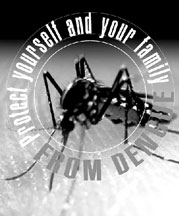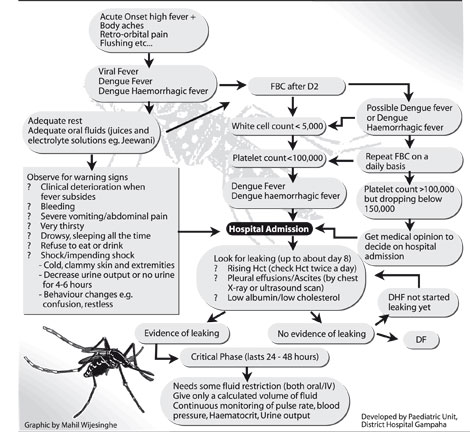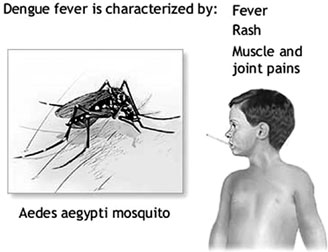|

Dengue:
Dropping platelet count no cause for alarm- Government Paediatric
Consultant
By Manjula FERNANDO
Somasiri arrived at a private clinic in Gampaha to get his
handicapped daughter some medicine for her illness - a persistent cough.
He was worried and wished that the bill would be a lesser burden on his
already sapped wallet.
 Although the nine-year-old is an 'acutely disabled' who is way beyond
any hope of restore, it was pretty obvious that the child was the apple
of his eye. Although the nine-year-old is an 'acutely disabled' who is way beyond
any hope of restore, it was pretty obvious that the child was the apple
of his eye.
But it was not the girl who caught the attention of the sharp-eyed
Doctor in charge at the clinic. She had a case of an ordinary viral flu.
It was the father who appeared a lot more sick than the child.
Upon inquiries he told the Doctor that he had been having fever for
the past few days. The Doctor asked him to get a full blood count and
get himself admitted to a hospital. Somasiri who regarded looking after
the daughter was more important was very reluctant on the prospect.
The Doctor then called one of his juniors and saw to it that he was
admitted to Gampaha hospital.
The blood test revealed that Somasiri's platelet count was an
alarming 8,000 - a sure sign that he was having Dengue Fever (DF) or may
be the fatal Dengue Haemorrhagic Fever known as DHF.
The doctors at Gampaha hospital were using a novel treatment method
based on a technique successfully applied in Thailand to manage the
Dengue Fever during its critical phase. Thai practice proved to have
brought down the fatalities related to Dengue Haemorrhagic fever
significantly in Thailand, where prevalence of Dengue is nine times
higher than Sri Lanka.
It was consultant Paediatrician Dr. Lak Kumar Fernando who had
returned after undergoing training in Thailand along with eight other
consultants learning the novel treatment techniques, who identified the
critical signs in Somasiri.
"Hadn't he brought that child to the clinic the father would have
most probably died of Dengue," Dr. Fernando told the Sunday Observer. He
was destined to live and love his daughter.
The doctors at Ward 11 of Gamapaha Hospital closely monitored
Somasiri. Despite his low platelet count he was never given platelet
transfusions. Instead they restricted his fluids and monitored the
counts. He gradually improved. He is still in the medical ward of
Gampaha Hospital. The doctors found that his wife had also been having
dengue. She was also treated.
"Platelet transfusions are very rarely needed in the treatment of DHF,"
Dr. Mihira Manamperi, the Paediatric Registrar of the Gampaha hospital
said. He is among the team of doctors who make use of the Thai treatment
technique that has been developed after 40 years of research. It has
seen a vast improvement in recoveries with regard to worst case
scenarios of DHF.
"Platelet counts are a very good indication to determine the phase of
the DHF patient - whether he is heading towards the 'critical phase'.
With the reading of the platelet count we can identify if the patient
is deteriorating or not, It's the nature's way of sending an SOS."
"We must reassure the public that Dengue is not a disease of
platelets. Platelet transfusion is not a treatment method for Dengue."
 The Kandy Hospital doctor who died of Dengue recently had recorded a
platelet count of 50,000 at the time of her death but in contrary
patients with lower counts have survived the disease. The Kandy Hospital doctor who died of Dengue recently had recorded a
platelet count of 50,000 at the time of her death but in contrary
patients with lower counts have survived the disease.
In the case of Dengue there are two varieties, Dengue fever DF and
DHF. All patients with just Dengue fever will undergo a 'Feverish Phase'
and the 'Recovery Phase'. About half of DF patients record platelet
counts below 100,000.
In DHF there is a feverish phase, critical phase and a recovery
phase.
The number of patients who suffer DHF is about 100 from 10,000 dengue
patients. All DHF patients get their platelets dropping below 100,000.
The critical phase of DHF has to be managed with extreme caution.
This is the phase the patients could die due to shock if inadequate
fluid is given. But if too much fluid is given during this period, they
might go into fluid overload later. During the critical phase that can
develop within the 3rd to 7th day of the onset of fever the patients
start plasma (the fluid in the blood) leakage through the tiny blood
vessels. This phase lasts for about 48-hours. During the height of the
leakage (after first 24 hours) the patients could completely leak one
bottle of ordinary saline into his abdominal or the chest cavities
within 1-2 hours. As a result he would develop breathing difficulties
due to fluid in the lungs.
Clinical administrating of fluid is needed to retain the lost fluid
in a DHF patient who develop plasma leakage, in order to prevent them
going into 'shock'. Shock is one of the two reasons for death in dengue.
But during the 48 hour critical phase the IV administration should be
done with extreme care and strict supervision of a skilled medical
practitioner.
The health Ministry has brought down a special drug Dextran 40 to
treat patients in this critical phase. The drug which is also an
Intravenous fluid like Saline does not seep through as easily as Saline.
Therefore the drug can minimize fatalities caused by fluid overload -
the second cause of death in Dengue.
Dengue deaths can be minimised if the patient and the condition is
properly managed during the critical stage of the disease, Dr.Manamperi
said.
Tests - when and what
* After second day of fever - Check Full Blood Count
* If the test results indicate a drop in white blood cells and
platelet count (eg.4000 WBC / 150,000 PLT) see doctor and repeat FBC
* If the platelet count is below 100,000 - see doctor immediately -
patient need hospital admission
* The special dengue test in hospitals cannot be deemed accurate
since if the patient has had a mild dengue attack recently he may carry
antibodies in the blood stream so the test will show a 'positive'
reading. Since antibody development will take time, sometimes dengue
antibody tests specially the rapid tests will be negative.
Indications
Headache or
severe headache
Lost apetite
Pain behind the eye ball
Red colour rash on skin
Slight nasal or
gum Bleeding
Red colour stools
and urine
* Some of these are
synonymous with
viral flue conditions
as well
Tips for mothers
A lots (reasonable amount) of fluids (electrolyte solutions) like
fruit juices, king coconut, and Jeevani should be given. Water alone is
not sufficient. Rest during the first few days of illness is a critical
factor.
A child or any person with suspected Dengue Fever should be allowed
to rest at home. Patients should not be given too much fluid after day 2
of illness because excessive fluids (even oral) can lead to fluid
overload in dengue haemorrhagic fever. Transition of dengue from a
person to person occurs when the patient has fever. So the patient
should be under a mosquito net when he is having fever.
Physical exertion was closely associated with the reported 64 deaths
in Gampaha district.(On an analysis of 64 patients who died in 2009, a
majority has had excessive physical exertion within the first two three
days of illness.) Dengue patients should be kept under a mosquito net to
prevent infection to others.
Breeding ground: In most cases dengue breeding ground is in your home
itself. If not, it could be your next door neighbour. The doctors say so
because the Dengue mosquito cannot fly long distances. So if your child
is affected by Dengue there is a breeding ground within your house or
property. Start cleaning up!
Papaw juice remedy
No hard evidence has been found to prove that papaw juice boosts your
Platelet count. It is not a chance you can afford to take when dealing
with a fatal disease like Dengue.
If papaw juice is increasing platelet count alone, without doing any
good to other problems of the disease there is a theoretical possibility
that this could even harm the patient because dropping of platelet count
below hundred thousand is the most useful indicator we have to identify
a patient entering the most dangerous critical phase (critical 48 hours)
of the illness. If the juice give a falsely high platelet count it may
delay or prevent us from detecting the patient entering the critical
phase.
Health Snippet:
Why hair turns grey
It is reported that experts are close to discovering what makes your
hair turn gray. Although graying hair is the easiest stage of ageing to
solve (with hair dyeing) it is often inconvenient because you have to
colour your hair so frequently to keep the gray roots from constantly
showing up. However, coloring your hair is easy, easier and cheaper than
let's say Botox or plastic surgery.
The gray hairs that develop with age really are signs of stress, at
least of the cellular kind, say scientists.
Genotoxic stress, namely anything that damages the genetic code of
life DNA, causes a malfunction of the cells ultimately responsible for
hair colour.
The stress sets off a chain of reactions involving specialised cells
called melanocyte stem cells, their work on mice in Cell journal
reveals. Similar mechanisms appear to be at work in humans too, they
say. The findings could help explain why people with Ataxia
telangiectasia, a rare, neurodegenerative syndrome caused by a mutation
in a gene called ATM, go grey prematurely. In their study, Dr Emi
Nishimura and colleagues found the ATM "caretaker" gene serves as a
checks and measures system to stop melanocyte stem cells going awry.
It is the job of these cells within the hair follicles to make the
mature pigment-producing melanocytes that give hair its youthful colour.
Damaged DNA
Researchers have already traced graying to the gradual dying off of
the stem cells.
But this is not the only way the stem cells are depleted. They also
progressively make errors, turning or differentiating into fully
committed pigment cells in the wrong place within the hair follicle,
where they are useless for colouring hair. And the latest work on mice
shows irreparable DNA damage, as caused by ultraviolet light and
ionising radiation is responsible.
Dr Nishimura of Kanazawa University said: "Once stem cells are
damaged irreversibly, the damaged stem cells need to be eliminated to
maintain the quality of the stem cell pool. "We found that excessive
genotoxic stress triggers differentiation of melanocyte stem cells." But
others believe going gray is caused by a massive build up of hydrogen
peroxide due to wear and tear of our hair follicles. The hydrogen
peroxide ends up blocking the normal production of melanin, an team of
European scientists recently reported in the FASEB scientific journal,
published by the Federation of the American Societies for Experimental
Biology.
Finding the cure to gray hair would be a miracle come true for most
people.
- BBC Health
'Discipline is the key to curb the dengue problem' - Director
of Health Services WP
by Nilma DOLE
 |
|
Dr. Amal Harsha de
Silva |
Dengue is Sri Lanka's buzzing topic and as a last resort to prevent a
serious epidemic, the health authorities and ministry of health
officials have decided to put the nail in the coffin by strengthening
the new Public Nuisance Ordinance. "We are in the final stages of
implementing strategic measures in getting the public to clean the
environment to not only wipe away mosquito breeding sites but to clean
the environment," said the Director of Health Services Western Province,
Dr. Amal Harsha de Silva. He said drastic steps had to be taken to clean
up the city of mosquito breeding sites by issuing a severe fine of Rs.
50,000 if people were found to be dumping garbage. "Often people dump
garbage at their neighbour's gate or drive to a different location and
dump at other sites. Such people should be fined on the spot for being a
public nuisance and not disposing their garbage in a good manner."
Mosquitoes breed in cesspits and even a teaspoon or two of water is a
thriving environment for them to breed.
Colombo's population is estimated to be about 6 million and as many
as 500,000 to 700,000 mosquito repelent coils are burned everyday in
households to keep mosquitoes at bay. Dr. de Silva said, "This is a
massive social cost on part of the general public and it is a kind of
economic burden when it comes to spending on mosquito prevention
measures." In addition to this, burning coils are some sort of air
pollution as well which is likely to cause side effects, so people
should be aware of the harmless effects coils have.
Speaking about the variety of mosquitoes, Dr. de Silva said, "There
are 145 species of mosquitoes where the five major disease-causing ones
are the mosquitoes that breed dengue, malaria, filaria, Japanese
encephalitis and chikungunya." While there are vaccinations for some of
these diseases, the only way to completely wipe out the disease is to
clean the environment.
| Steps
the public can take to eradicate dengue:
1. Stop illegal dumping of
garbage and dispose it in an environmentally-friendly
manner.
2. Inform health authorities
if you see anyone dumping garbage illegally
3. Look for organic ways of
eradicating the mosquito. For example, guppies and tilapia
in water ponds feed on mosquito larva and eggs.
4. Ask for help from your
local Pradeshaya Sabha, Public Health Inspectors and Medical
Officer of Health (MoH) for efficient ways to curb the
dengue problem.
5. Dengue patients can be
treated properly to ensure that you go to qualified and
experienced professionals when it comes to check-ups. |
"The Presidential Task Force for eradication of dengue was set up in
a bid to totally wipe out the mosquito but there are other matters
pertaining to it which is linked to controlling the problem," said Dr.De
Silva. He added, "I thank the health officials and public health
inspectors for working tirelessly, day and night and even on weekends to
ensure that households all across the Western Province have been cleared
of mosquito breeding sites."
The Colombo Municipal Council together with public health inspectors
(PHIs) have done their duty in serving the public. "Officials such as
G.H. Buddhadasa of the Kaduwela Pradeshiya Sabha, Omar Kamil of CMC,
Upali Kodikara of the Maharagama Pradeshiya Sabha have been instrumental
in helping the public beat the mosquito menace while areas such as
Dehiwala, Moratuwa, Wattala need to have stringent measures in place."
Speaking to the Sunday Observer about various scandals and public
eye-wash campaigns that have taken place to curb the dengue problem, Dr.
De Silva said, "There are plenty of officials who need to be taken to
task for not serving the public in wiping out the mosquitoes. Also, just
by 'fogging', it isn't sufficient to eradicate the mosquitoes." Grass
roots measures need to be in place to control mosquitoes so that there
isn't any ability for them to reproduce. "The BTI bacteria isn't enough
to eradicate the mosquito problem because it feeds on the mosquito larva
and eggs and stops there without propagating. There have been medical
experts who have said that they have formulated a local bacteria and we
openly invite them if they have a solution that will multiply in a
nature-friendly manner without harming the environment and kill
mosquitoes," said the doctor.
With about 70,000 people dying of dengue so far, the Ministry of
Health has taken strict steps to ensure that every health officials from
the lowest to the highest level have been educated and trained on the
topic. "At the municipal council level, we have various officials like
the divisional secretariat, the respective Mayors, Chairmen of the
Pradeshaya Sabhas, Grama Niladhari, the PHIs, MoHs and other health and
government agents to help in giving the public sound advice and
facilities to stop the mosquito problem."
 Dr. Amal Harsha de Silva is optimistic that in six months that the
mosquito menace can be brought under control. "We have had a massive
response from the public and are happy that they are vigilant in
detecting mosquito breeding sites as they play an immense role in
beating the dengue fever." He said that it will be a matter of time when
the country will be cleaner and a safer place for visitors to see a
cleaner and greener Sri Lanka. Dr. Amal Harsha de Silva is optimistic that in six months that the
mosquito menace can be brought under control. "We have had a massive
response from the public and are happy that they are vigilant in
detecting mosquito breeding sites as they play an immense role in
beating the dengue fever." He said that it will be a matter of time when
the country will be cleaner and a safer place for visitors to see a
cleaner and greener Sri Lanka.
"Once we have the new Public Nuisance Ordinance implemented, our
country will be better than Singapore and tourists will flock here
instead of being discouraged when it comes to sensationalised reporting
of dengue. So far, we have managed to keep dengue at bay and we are
training our medical professionals in dealing with dengue patients,"
said Dr. de Silva. Like we have eradicated the war, we are sure to
eradicate the mosquito menace too! |

